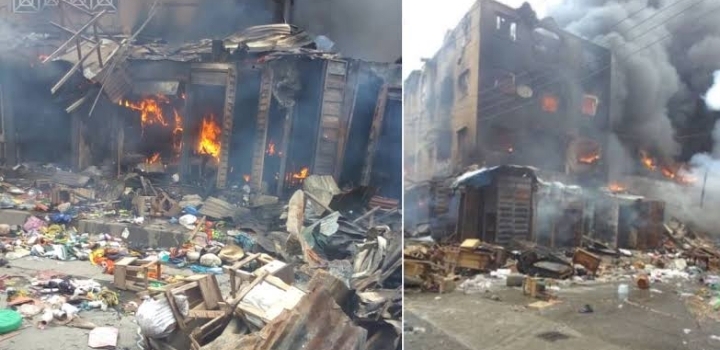A year after flames swept through the bustling Dosunmu Market in Lagos Island, some traders are slowly rising from the ashes—one bank loan, one rebuilt shop, one act of resilience at a time.
The fire, which tore through 14 buildings on April 9, 2024, turned thriving businesses and decades of hard work into smouldering ruins, leaving behind heartbreak, loss, and uncertainty.
But amid the wreckage, stories of survival and new beginnings are emerging.
Alhaja Modinat Bakare, a tailoring accessories importer and long-time trader, had just stocked her warehouses when disaster struck.
“Everything I worked for over 40 years was gone in a day,” she said, her voice still heavy with emotion, in an interview with the News Agency of Nigeria (NAN).
Bakare revealed that the fire wasn’t her first heartbreak—months earlier, she had lost another shipment stored in a friend’s warehouse. But the April inferno was the final blow.
“I watched my two warehouses burn, powerless,” she said. “I had loans to repay and no business left.”
Through the intervention of IBILE Microfinance Bank Ltd., Bakare received a vital lifeline.
The bank helped clear her existing loans and granted her fresh credit at a lower interest rate. She is now back in business—cautious, but grateful.
“I am not fully recovered, but IBILE saved me. Without their help, I don’t know where I would be,” she said.
For Mr. Olabanji Raheem, a dealer in baby care products, the fire didn’t just destroy goods—it erased a legacy.
“I lost 24 shops, a building, everything,” he recalled. “It was a dark moment.”
Today, Raheem leads the Moshalashi Traders Association and now advocates for insurance awareness among fellow traders.
He credits IBILE Microfinance and its insurance partners for helping him get back on his feet.
“We don’t think about insurance until tragedy hits,” he said. “This experience taught us that lesson the hard way. Not everyone was as lucky.”
Chima Nwakwo, an importer, is still reeling from the loss of goods worth hundreds of millions of naira.
“The government gave out funds—some got N2 million, N1.5 million, or N500,000. I got nothing,” he said.
“I had to fall back on another business investment to start again.”
The silence in his voice speaks louder than words: survival in a system that sometimes forgets those it should protect.
Mr. Emmanuel Nnoli, another tailoring accessories dealer, believes rebuilding must include structural reforms.
“We need fire stations inside our markets,” he told NAN. “The recent fire was contained only because traders acted fast. Next time, we may not be so lucky.”
He also missed out on IBILE’s low-interest loans and found himself entangled in a high-interest debt trap.
“If I had known about the bank’s offer earlier, things might be easier,” he said.
At the heart of this recovery effort is IBILE Microfinance Bank Ltd.
NAN reports that the acronym IBILE represents the five divisions in Lagos State: Ikeja, Badagry, Ikorodu, Lagos Island, and Epe.
The Managing Director of the bank, Mr. Adegboyega Kazeem, said the bank’s rapid intervention was driven by the need to protect Small and Medium Enterprises—the backbone of Lagos’ economy.
“We didn’t just give loans,” he said. “We walked with our customers, offering financial guidance, insurance education, and constant support.”
The bank, established by the Lagos State Government in 2017, continues to work with traders to ensure financial inclusion, especially in underserved communities.
For the traders of Dosunmu Market, rebuilding has gone beyond restoring shops. It has become a story of resilience, collective support, and the power of second chances.
“Everything I have now,” Bakare said, “is from starting again. And I’m still standing.”

